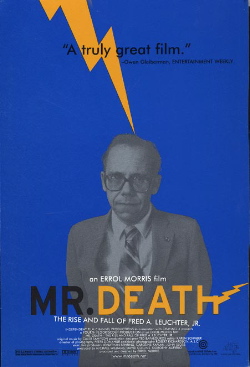Errol Morris is a documentarian who has made a career out of interviewing the eccentric and the quirky.
In My Psychedelic Love Story, he interviews Joanna Harcourt-Smith who, way back in the 1970s, was the lover of Acid guru Dr. Timothy Leary. She was in her 20s and he was in his 50s but they still apparently had a wonderful time as exiles in Europe. Leary, at the time, was a fugitive, having escaped from prison and fled to Switzerland. (Before his escape, he was serving a 20-year sentence after being convicted of possessing two joints. Leary claimed that he was set up by the arrest officer. Still, the fact that two joints led to a 20-year sentence tells you all you need to know about American drug laws in the 60s and 70s.) Leary and Joanna spent a few years as glamorous international exiles, staying at the homes of the rich and self-styled decadent. Eventually, Leary was captured and, upon returning to the United Sates, became an informant for the FBI. Though Leary always claimed that he gave the FBI useless information (and reportedly, no one was ever convicted of any crimes based on any of the information that Leary provided), his decision to “cooperate” with the authorities was viewed as a betrayal by many members of the counterculture.
As usually happens whenever a male cultural figure lets down his disciples, the woman was blamed. Many — including Allen Ginsberg — suggested that Joanna Harcourt-Smith was actually an agent of the CIA who had not only arranged Leary’s capture but who was also responsible for him eventually cooperating with the government. Interestingly enough, in My Psychedelic Love Story, Joanna also suggests that she may have been unknowingly manipulated by the CIA to take Leary down.
That’s one of the many stories that Joanna Harcourt-Smith tells over the course of My Psychedelic Love Story. Though the film largely focuses on her relationship with Leary, Harcourt-Smith also talks about her childhood and her life after her break-up with Leary. Some of the stories are interesting and, to be honest, some of them are more than a little boring. The documentary never quite convinces us that Joanna Harcourt-Smith is as fascinating as she and Morris seem to believe that she is. Perhaps her most interesting moment comes when she says that she has a long history of lying.
If anything, Harcourt-Smith comes across as being the type of figure who is familiar to anyone who has actually researched the counter culture of the 60s and 70s, the wealthy hippie who can afford to rebel because her position in society is guaranteed regardless of how that rebellion turns out. Harcourt-Smith often comes across as something a dilettante, someone who got involved in radical politics because, at the time, that was the thing to do. Listening to her speak, I was reminded of the end of the film Guerilla, in which former left-wing terrorist Patty Hearst, having been pardoned by the president, smiled and said that she was looking forward to going home. (Home happened to be a mansion.) That’s not to say that Harcourt-Smith was brainwashed as much to suggest that one reason why she could do what she did was because she had the escape clause of being from a wealthy and connected family.
As for Leary, the documentary features recordings of him speaking but he remains an enigmatic figure. At times, he comes across as being very sincere. At other times, he comes across as being a manipulative Svengali. At his worst, he comes across as being a character straight from an Aaron Sorkin screenplay. One can easily imagine Sorkin writing a screenplay about how Leary was betrayed by every woman he ever met. (“I could have turned the world on, if not for those women with their pesky opinions!”)
Despite all of that, My Psychedelic Love Story is still an interesting historical document. If you’re a student of the 60s and 70s cultural history, you’ll want to watch it. The film may leave you frustrated but it’s still a chance to hear about the era from someone who was there.

